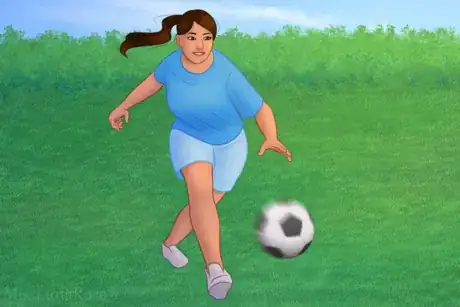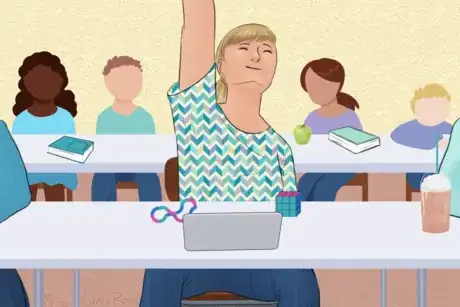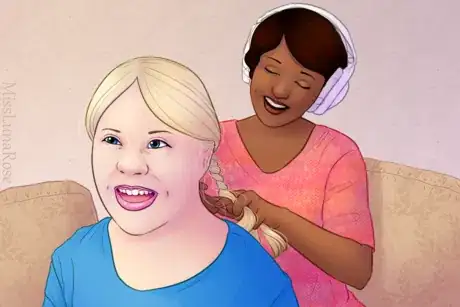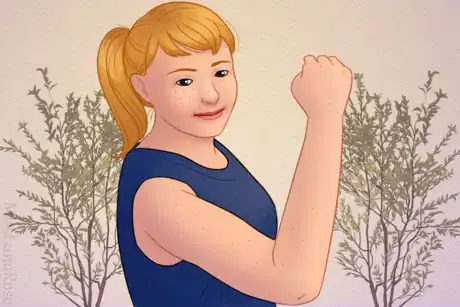This article was co-authored by Rebecca Tenzer, MAT, MA, LCSW, CCTP, CGCS, CCATP, CCFP. Rebecca Tenzer is the owner and head clinician at Astute Counseling Services, a private counseling practice in Chicago, Illinois. With over 18 years of clinical and educational experience in the field of mental health, Rebecca specializes in the treatment of depression, anxiety, panic, trauma, grief, interpersonal relationships using a combination of Cognitive Behavioral therapy, Psychodynamic therapy, and other evidence-based practices. Rebecca holds a Bachelor of Arts (BA) in Sociology and Anthropology from DePauw University, a Master in Teaching (MAT) from Dominican University, and a Master of Social Work (MSW) from the University of Chicago. Rebecca has served as a member of the AmeriCorps and is also a Professor of Psychology at the collegiate level. Rebecca is trained as a Cognitive Behavioral Therapist (CBT), a Certified Clinical Trauma Professional (CCTP), a Certified Grief Counseling Specialist (CGCS), a Clinical Anxiety Treatment Professional (CCATP), and a Certified Compassion Fatigue Professional (CCFP). Rebecca is also a member of the Cognitive Behavioral Therapy Society of America and The National Association of Social Workers.
This article has been viewed 52,831 times.
A strong girl is brave, adventurous, and powerful. She is confident, willing to try new things, and persistent in learning new skills.
Steps
Building Physical Strength
It's good to build a strong, capable body as a girl. Get plenty of exercise and focus on what your body can do.
-
1Eat from all food groups and stay hydrated. Protein (meat, fish, eggs, nuts, tofu) will help you build muscle mass. Fruits and vegetables will give you the vitamins and minerals you need to stay strong and capable. Fats and desserts also matter for brain and cellular health. Keep a glass of water at your desk, as well as having something to drink with each meal.
-
2Get at least 8 hours of sleep. Your body needs sleep in order to recharge and grow strong. If you wear yourself out, you won't be able to perform well the next day.Advertisement
-
3Take breaks from computer time. Even a two-minute break to stretch your legs is good for your health. Go get a glass of water or some food, take a bathroom break, or hang out with one of your siblings for a little. This will be easier on your eyes, muscles, and mind.
-
4Find a form of exercise you enjoy. Exercise will build muscles, as well as supporting your emotional strength. Do you like to hike, run, walk, swim, or jog? Do you prefer to exercise by yourself, or with friends or family?
-
5Do strength training. You don't have to lift weights (although this can really help you get stronger). You can use your body weight. Do pull-ups, chin-ups, muscle-ups, push-ups, etc. Increase your reps as you get stronger. Always challenge yourself and push yourself to the limit, but make sure you stretch before to avoid getting hurt.
-
6Play sports. Any sports, any exercise that works your muscles, will make you stronger over time. Soccer, basketball, swimming, gymnastics, and rock climbing are all good ways to build muscle. Taking gymnastics will improve your physical strength, flexibility, stability, and much more. Only play sports that you find fun and you like.
- If you don't enjoy group sports, try shooting hoops by yourself or setting and breaking personal goals.
- Backyard sports can be fun too! Try playing sports informally with friends or family members. You don't have to keep score if you don't want to.
-
7Be careful not to overwork yourself. Stretch and warm up before doing sports, and take a minute or two afterwards to cool down by walking or stretching some more. Strength is built up over time, and it's important to respect your body's limits.
Building Mental Strength
Your brain is growing and developing in fantastic ways. Challenge yourself and learn new things to develop a strong mind.
-
1Pay attention in school, and do your best. Doing well is about more than talent—it's most important to be a hard worker. Practice studying and working hard at school, and you will grow way ahead as you get older.
-
2Experiment. You have many years of life ahead of you, and now is a great time to try new ideas. Pick up a book about toy robots, learn to jet ski, make up a cookie recipe, or try out your hand at writing stories. Find out which ideas stick and which ones don't.
-
3Read often. Fiction books are fun and insightful, and you can also read nonfiction to learn facts about things you love. Try a variety of genres and figure out which ones you love best. Specialize in your favorite areas, and also read something else every once in a while just to shake things up.
- If you want to be inspired, read books about female doctors, lawyers, inventors, artists, musicians, political figures, and rocket scientists. You'll see that women can do great things![1]
-
4Foster a love of learning. Curiosity and love of knowledge are important traits in a young woman. Find what subject matters you truly enjoy, check out books from the library, and investigate new ideas.
- Investigate side areas you love outside of school. Are you interested in robotics, feminism, oil paints, molecular science?
-
5Ask others for their ideas. Everyone has different thoughts and opinions, and you can develop more nuanced ideas by listening to other perspectives.
- Ask your dad to edit your short story.
- Listen to people who have conflicting opinions. Why do they disagree? What are your thoughts on the issue?
- Ask your sister to explain her science project to you.
- Get reading suggestions from a teacher.
Building Emotional Strength
Emotional strength is how well you handle your problems and emotions. An emotionally strong girl is kind and resilient, and she bounces back when life throws problems at her.
-
1Embrace who you are. Your identity is important, and you don't have to fight it. It's okay to be tall, chubby, artistic, disabled, geeky, introverted, and whatever else you are. You have your own unique style and personality, and your traits don't make you inferior to anyone else.
-
2Take time to understand your emotions. Your feelings are important, and it's good to recognize them and find healthy ways to channel them. It's normal to experience a range of emotions, and learning to deal with them is an important part of growing up.
- If you are angry, try taking a walk, getting exercise, reading, or taking some quiet time to calm down.
- If you're sad, spend time with a pet or loved one, take good care of your body, and talk to someone about how you're feeling.
- If you're scared or worried, do something about the thing that scares you (e.g. making an action plan), take some deep breaths, or tell an adult how you feel.
-
3Take time to relax every day. Relaxation is an important part of feeling healthy and balanced, and it'll allow you to stay calm when problems come your way. Do your hobbies, read a fun book, go for a walk, take a relaxing bath, or spend time with someone you love.
-
4Break big problems into little pieces. Sometimes tasks feel overwhelming, to the point that it's difficult to start. When this happens, you can write down the steps you'll need to take, and only do one at a time. For example, if you have to write an essay, write one paragraph now, and then go play with your dog.
- Taking breaks is an important life skill! It will help keep you from feeling overwhelmed, and you will be able to focus better when you sit down again.
- Write out a schedule if it helps.
-
5Learn to ask for help. Part of being strong is recognizing when something is too big for you to face alone. You might want to ask an adult for advice, or get help in solving whatever problem you're facing. Sometimes, you might just need a hug and a listening ear. Recognizing that you need help, and going to ask for it, is a sign of bravery.
-
6Recognize that you don't have to be stoic all the time. It's okay to have bad days, and it's okay to be vulnerable. Your strength isn't determined by whether you cry or not—it's about how you bounce back from problems. Plenty of strong people ask for help and need to lean on other people sometimes.
-
7Don't listen to bullies. You will find people who dislike you for no good reason, and who like to insult you or try to get in your way. You don't need to listen to them. Being polite is good, but you don't have to stand around putting up with a mean person just for the sake of manners.
- Say "please stop" or "I'm busy" if someone won't leave you alone.
- If you're being insulted, pretend not to have heard them, or say "I'm okay, you're mean." This takes all the fun out of it for the bullies.
- Tell an adult if handling it yourself doesn't work, or if you don't know what to do.
-
8Build strong relationships. Think of people you can talk to when you're having a bad day—parents, friends, siblings, and other people in your life. Take time for those who are important to you.
-
9Spend time with people who make you feel better about yourself and the world. Look for friends who are positive, kind, and respectful of other people. These friends can lift you up, and help you feel and be your best.
-
10Practice kindness. Give sincere compliments, use good manners, help people in need, and reach out to other people who look friendly. An attitude of kindness will draw people to you and help make life easier for you.
-
11Recognize your own power. Refuse to let negative stereotypes hold you back. Tell yourself that you can. Practice power posing, recognize that you're skilled, and work on building your own confidence. You are stronger than you know.
- Try saying an affirmation to yourself in the mirror each morning, like, "I am good enough, I am smart enough, and I can do great things."[2]
Expert Q&A
-
QuestionHow do you teach a girl to be a woman?
 Rebecca Tenzer, MAT, MA, LCSW, CCTP, CGCS, CCATP, CCFPRebecca Tenzer is the owner and head clinician at Astute Counseling Services, a private counseling practice in Chicago, Illinois. With over 18 years of clinical and educational experience in the field of mental health, Rebecca specializes in the treatment of depression, anxiety, panic, trauma, grief, interpersonal relationships using a combination of Cognitive Behavioral therapy, Psychodynamic therapy, and other evidence-based practices. Rebecca holds a Bachelor of Arts (BA) in Sociology and Anthropology from DePauw University, a Master in Teaching (MAT) from Dominican University, and a Master of Social Work (MSW) from the University of Chicago. Rebecca has served as a member of the AmeriCorps and is also a Professor of Psychology at the collegiate level. Rebecca is trained as a Cognitive Behavioral Therapist (CBT), a Certified Clinical Trauma Professional (CCTP), a Certified Grief Counseling Specialist (CGCS), a Clinical Anxiety Treatment Professional (CCATP), and a Certified Compassion Fatigue Professional (CCFP). Rebecca is also a member of the Cognitive Behavioral Therapy Society of America and The National Association of Social Workers.
Rebecca Tenzer, MAT, MA, LCSW, CCTP, CGCS, CCATP, CCFPRebecca Tenzer is the owner and head clinician at Astute Counseling Services, a private counseling practice in Chicago, Illinois. With over 18 years of clinical and educational experience in the field of mental health, Rebecca specializes in the treatment of depression, anxiety, panic, trauma, grief, interpersonal relationships using a combination of Cognitive Behavioral therapy, Psychodynamic therapy, and other evidence-based practices. Rebecca holds a Bachelor of Arts (BA) in Sociology and Anthropology from DePauw University, a Master in Teaching (MAT) from Dominican University, and a Master of Social Work (MSW) from the University of Chicago. Rebecca has served as a member of the AmeriCorps and is also a Professor of Psychology at the collegiate level. Rebecca is trained as a Cognitive Behavioral Therapist (CBT), a Certified Clinical Trauma Professional (CCTP), a Certified Grief Counseling Specialist (CGCS), a Clinical Anxiety Treatment Professional (CCATP), and a Certified Compassion Fatigue Professional (CCFP). Rebecca is also a member of the Cognitive Behavioral Therapy Society of America and The National Association of Social Workers.
Clinical Therapist & Adjunct Professor Clinical Therapist & Adjunct ProfessorExpert AnswerIt’s important that all children feel valued, build self-esteem, and are surrounded by positive reinforcement, and this is especially important for young girls. They need to see women in power, strong and intelligent women of all shapes, backgrounds, colors and sizes who are achieving their goals and dreams.
Clinical Therapist & Adjunct ProfessorExpert AnswerIt’s important that all children feel valued, build self-esteem, and are surrounded by positive reinforcement, and this is especially important for young girls. They need to see women in power, strong and intelligent women of all shapes, backgrounds, colors and sizes who are achieving their goals and dreams. -
QuestionHow do I recognize my worth?
 Rebecca Tenzer, MAT, MA, LCSW, CCTP, CGCS, CCATP, CCFPRebecca Tenzer is the owner and head clinician at Astute Counseling Services, a private counseling practice in Chicago, Illinois. With over 18 years of clinical and educational experience in the field of mental health, Rebecca specializes in the treatment of depression, anxiety, panic, trauma, grief, interpersonal relationships using a combination of Cognitive Behavioral therapy, Psychodynamic therapy, and other evidence-based practices. Rebecca holds a Bachelor of Arts (BA) in Sociology and Anthropology from DePauw University, a Master in Teaching (MAT) from Dominican University, and a Master of Social Work (MSW) from the University of Chicago. Rebecca has served as a member of the AmeriCorps and is also a Professor of Psychology at the collegiate level. Rebecca is trained as a Cognitive Behavioral Therapist (CBT), a Certified Clinical Trauma Professional (CCTP), a Certified Grief Counseling Specialist (CGCS), a Clinical Anxiety Treatment Professional (CCATP), and a Certified Compassion Fatigue Professional (CCFP). Rebecca is also a member of the Cognitive Behavioral Therapy Society of America and The National Association of Social Workers.
Rebecca Tenzer, MAT, MA, LCSW, CCTP, CGCS, CCATP, CCFPRebecca Tenzer is the owner and head clinician at Astute Counseling Services, a private counseling practice in Chicago, Illinois. With over 18 years of clinical and educational experience in the field of mental health, Rebecca specializes in the treatment of depression, anxiety, panic, trauma, grief, interpersonal relationships using a combination of Cognitive Behavioral therapy, Psychodynamic therapy, and other evidence-based practices. Rebecca holds a Bachelor of Arts (BA) in Sociology and Anthropology from DePauw University, a Master in Teaching (MAT) from Dominican University, and a Master of Social Work (MSW) from the University of Chicago. Rebecca has served as a member of the AmeriCorps and is also a Professor of Psychology at the collegiate level. Rebecca is trained as a Cognitive Behavioral Therapist (CBT), a Certified Clinical Trauma Professional (CCTP), a Certified Grief Counseling Specialist (CGCS), a Clinical Anxiety Treatment Professional (CCATP), and a Certified Compassion Fatigue Professional (CCFP). Rebecca is also a member of the Cognitive Behavioral Therapy Society of America and The National Association of Social Workers.
Clinical Therapist & Adjunct Professor Clinical Therapist & Adjunct ProfessorExpert AnswerFemales in our society have historically been told they aren’t good enough, smart enough or strong enough to do the things that men can. In order to restructure those cognitions and the historical significance behind sexism, we must start at an early age to provide girls with the confidence to do great things.
Clinical Therapist & Adjunct ProfessorExpert AnswerFemales in our society have historically been told they aren’t good enough, smart enough or strong enough to do the things that men can. In order to restructure those cognitions and the historical significance behind sexism, we must start at an early age to provide girls with the confidence to do great things.
Warnings
- Benching, weightlifting, powerlifting, etc. are all good ways to get stronger.⧼thumbs_response⧽
- Be relaxed and try not to worry about things too much, sometimes it's good to stay alone in a peaceful place and just let your stress go.⧼thumbs_response⧽





















































































